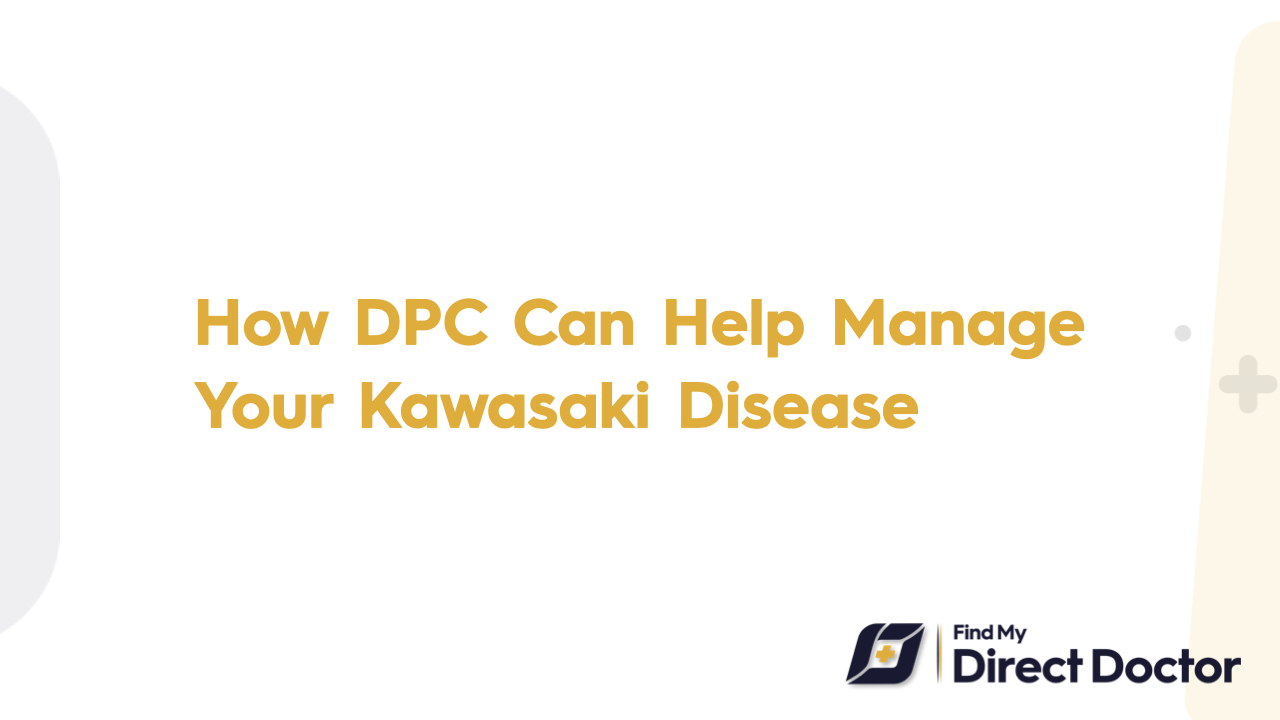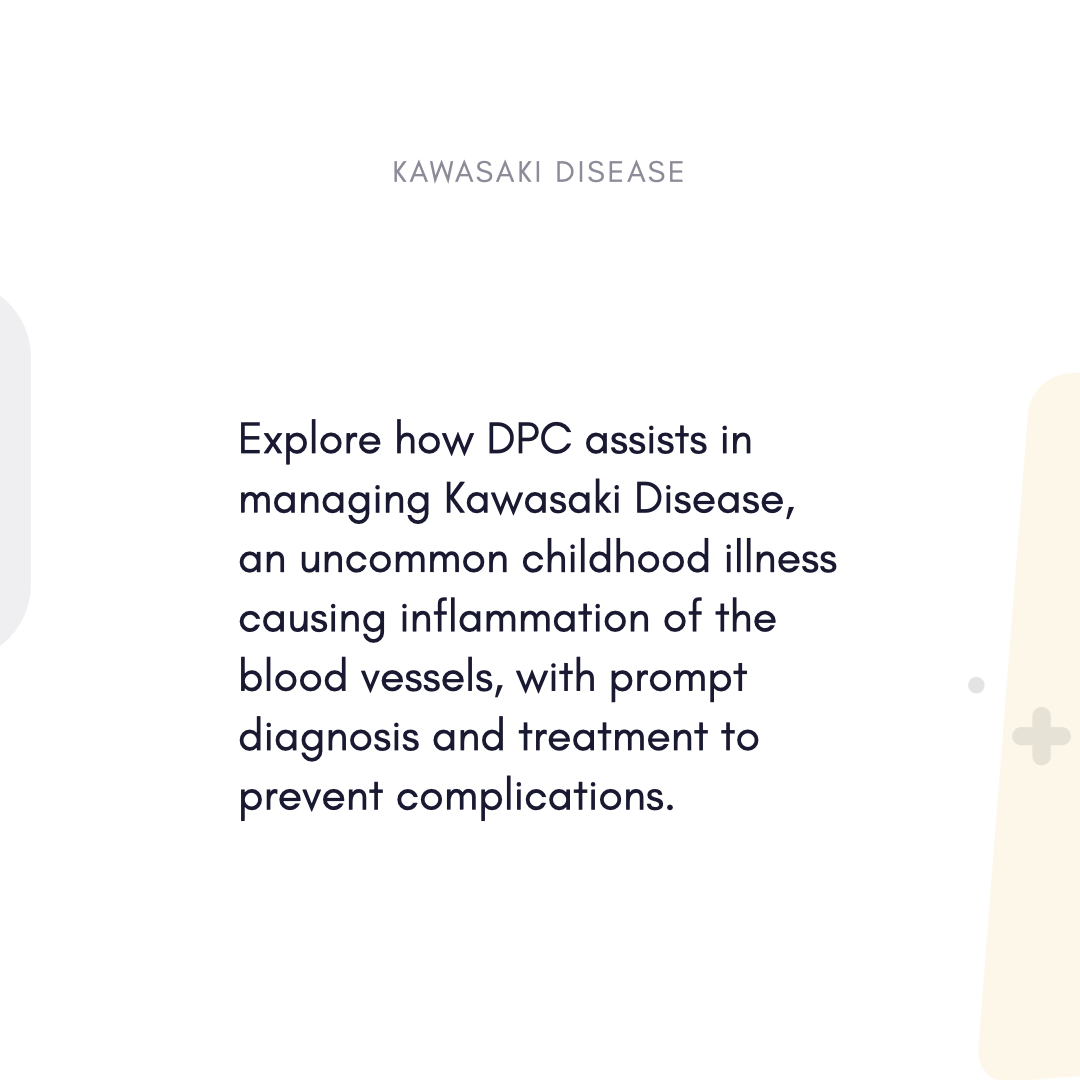Kawasaki Disease and Direct Primary Care (DPC): Your Path to Timely, Compassionate Care
Affected 1 in 10,000 children under 5 in the United States, Kawasaki Disease (KD) is a rare but severe childhood illness causing inflammation of blood vessels including coronary arteries. Early diagnosis and treatment are crucial to avoid heart problems; yet, conventional medicine sometimes misses small symptoms or delays referrals. With quick access, tailored follow-up, and flawless coordination between families and experts—ensuring the best outcomes for your child—Direct Primary Care (DPC) changes KD management.

Knowing Kawasaki Disease
Leading cause of acquired heart disease in children under five and acute systemic vasculitis, KD is:
- Important traits consist in:
- Five plus days of a prolonged fever.
- Rash; red eyes; swollen hands or feet; cracked lips; "strawberry tongue."
- Swollen lymph nodes.
Among treated cases, 15–25% develop coronary artery aneurysms; myocarditis or long-term heart damage also occurs.
Diagnosis: Clinical criteria plus high inflammatory markers (CRP, ESR).
Treatment within ten days of fever start consists in intravenous immunoglobulin (IVIG) plus high-dose aspirin.
Delayed treatment raises cardiac risks, thus early recognition and follow-up are especially important.
How DPC Transforms Kawasaki Disease Management
Under the membership concept known as Direct Primary Care (DPC), families pay a monthly fee—usually USD 50–USD 150—for unrestricted access to their pediatrician. This translates for KD patients into no wait times, no surprise bills, and treatment emphasizing quick intervention and lifetime heart health.
Customized Approach Anchored in Expertise
DPC pediatricians provide according to American Heart Association (AHA) guidelines and follow:
- Early recognition: Same-day visits for KD symptoms or ongoing fevers.
- Coordination in diagnostics:
- Labs: CRP, ESR, platelet counts.
- Working with pediatric cardiologists, echocardiograms to rule out aneurysms.
- IVIG coordination: Fast-tracking hospital referrals for critical treatment.
- Long-term monitoring: Frequent cardiac ultrasounds and inflammatory marker tests for one to two years following diagnosis.
Transparent, Cost-Effective Treatment
Through discounted labs—CRP/ESR tests at cost—DPC clinics help to lower financial stress:
- No hidden fees: Open pricing for specialist coordination or follow-up visits.
- Preventive focus: Avoiding ER delays that increase aneurysm risks.
Comprehensive Coordination of Care
Working with cardiologists, rheumatologists, and experts for difficult cases, DPC guarantees cohesive, multidisciplinary treatment:
- Simplifying provider communication helps prevent scattered care.
- Overseeing post-treatment follow-ups including lifestyle advice and aspirin dose changes.
DPC's Customized KD Management
DPC tailors treatment to your child's needs:
- Acute phase: Quick IVIG coordination, fever control, and parental education.
- Subacute phase: Monitoring platelet spikes and aneurysms.
- Convalescent phase: Reviewing echocardiograms and cardiac follow-ups.
- Screening siblings for incomplete KD symptoms helps prevent recurrence.
Real-Life Success Stories
- Case 1: Three-year-old Liam developed a six-day fever and rash. His DPC pediatrician ordered same-day labs/echocardiograms and coordinated IVIG within 24 hours suspecting KD. Two years later, Liam's coronary arteries are still normal.
- Case 2: Four-year-old Sofia developed an aneurysm following KD. Her DPC doctor teamed with a cardiologist to manage aspirin therapy, lifestyle changes, and biannual echos. By age six, Sofia's aneurysms healed.
Frequently Asked Questions: DPC and Kawasaki Disease
- Q: Can DPC detect KD without a specialist?
A: DPC pediatricians are trained to identify KD's symptoms and speed specialist cooperation for confirmation.
- Q: For long-term cardiac monitoring, is DPC reasonably priced?
A: Certainly! Memberships provide unlimited visits, and discounted echos lower costs compared to conventional models.
- Q: If my child needs a pediatric cardiologist, what then?
A: Your DPC doctor guarantees seamless communication and manages referrals to provide coherent treatment.
Why DPC Wins for Kawasaki Disease Patients
DPC’s approach aligns with AHA recommendations by:
- Speed: Same-day assessments within the ten-day critical window.
- Customized plans: Tailored treatment and regular monitoring to meet changing needs.
- Affordability: Access to discounted labs, imaging, and specialist coordination.
- Continuity: One provider following cardiac health from diagnosis through adulthood.
Save Your Child's Heart with DPC Right Now
Direct Primary Care gives you a partner who balances urgency with compassion, ensuring your child receives life-saving treatment and lifetime monitoring. Kawasaki disease is a race against time.
- How DPC specifically helps with KD:
- Improved accessibility: Shortened wait times for specialist referrals and critical evaluations.
- Early intervention: Targeted treatment to reduce coronary artery damage.
- Multidisciplinary coordination: Closing gaps by integrating primary care, cardiology, and hospitals.
- Family-centered support: Emotional guidance and education to help families navigate KD's challenges.
- DPC provides families:
- 24/7 access to address issues during KD's acute phases.
- Financial clarity—no surprise bills during a difficult period.
- Peace of mind: A reliable pediatrician guiding every step.






